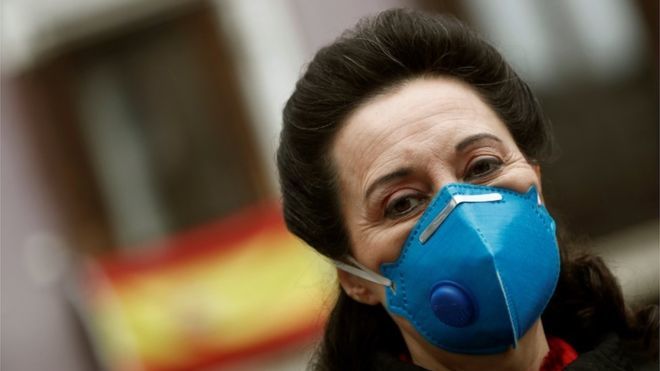 |
| Easter celebrations have been cancelled across Spain and people encouraged to worship remotely |
Lifting coronavirus lockdown measures too early could spark a "deadly resurgence" in infections, the World Health Organization chief has warned.
Dr Tedros Adhanom Ghebreyesus said countries should be cautious about easing restrictions, even as some struggle with the economic impact.
He said there had been a "welcome slowing" of the epidemics in some European countries.
But there is an "alarming acceleration" in other countries including in Africa.
Globally there are 1.6 million cases of coronavirus and 97,000 deaths.
Dr Tedros said the WHO was working with countries to form strategies for easing restrictions.
"I know that some countries are already planning the transition out of stay-at-home restrictions. WHO wants to see restrictions lifted as much as anyone," he told a virtual news conference in Geneva.
"At the same time, lifting restrictions too quickly could lead to a deadly resurgence. The way down can be as dangerous as the way up if not managed properly."
It comes as the government in Spain, one of the world's worst-hit countries, prepares to allow some non-essential workers in sectors including construction and factory production to return to their jobs on Monday.
Spain recorded its lowest daily death toll in 17 days on Friday, with 605 people dying. According to the latest figures, Spain has now registered 15,843 deaths related to the virus.
However, the government has urged people to continue to uphold social distancing rules as the country celebrates the Easter weekend.
Elsewhere:
- Irish Prime Minister Leo Varadkar has announced his country's lockdown measures will be extended until 5 May
- The UK government is under pressure to explain how curbs could eventually be lifted but says lockdown restrictions will remain until evidence shows the peak has passed
- South Africa's President Cyril Ramaphosa said late on Thursday that the country's 21-day lockdown would be extended for a further 2 weeks - a move the main opposition party said would cause economic disaster
Speaking on Friday, Dr Tedros welcomed signs that the spread of the virus was slowing in some of the hardest-hit countries in Europe - namely Spain, Italy, Germany and France.
The number of deaths in Italy rose by 570 on Friday, down from a daily figure of 610 the day before, and the number of new cases also slowed slightly to 3,951 from 4,204.
But Dr Tedros warned that the virus was now spreading rapidly in some other countries and highlighted Africa, where he said the virus had reached rural areas.
"We are now seeing clusters of cases and community spread in more than 16 countries" on the continent, he said.
"We anticipate severe hardship for already overstretched health systems, particularly in rural areas, which normally lack the resources of those in cities." BBC